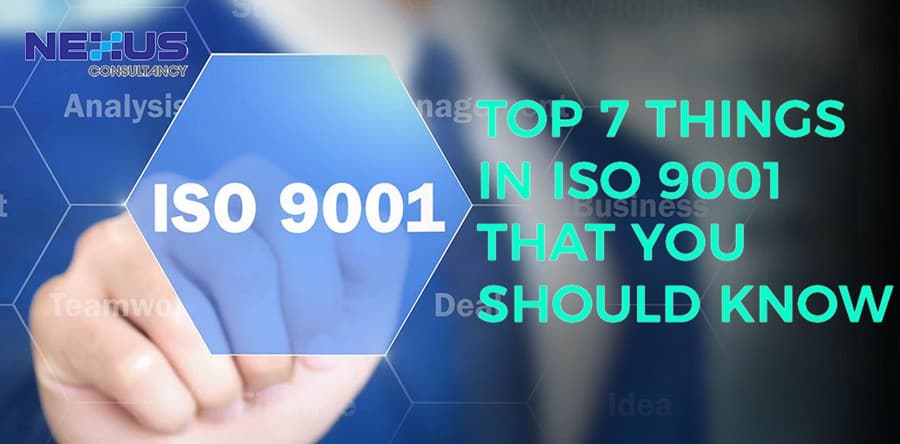
Top 7 Things in ISO 9001 That You Should Know

Nicole Choo
Management Consultant
Before revealing the above context, you might need to understand a few details of ISO 9001.
ISO 9001 is an international standard for a Quality Management System (QMS). Organizations use it to allow their businesses to deliver high-quality products and services to customers.
-2 mins read
Is ISO 9001 for everyone?
ISO 9001 is a generic standard. In other words, it does not matter the size of your organization or the industry you are in. To name a few, it can be a manufacturing company, restaurant, consultancy firm, government entity or university. ISO 9001 is not a legal requirement for you to operate a business, but many companies found great success from being certified in the standard.
The benefits include but not limited to:
- Increasing productivity
- Reducing waste
- Producing quality products and services consistently
- Raising brand value
Quality is not merely associated with a specific product/service. It is also applied to the process that goes into producing the products or the services that is delivered to the customers. All aspects from the supply chain to the operation of the business follows the ISO 9001 standard to ensure that the quality is upheld and assured.
Hence, the top 7 things this system needs to focus on are:
1. Customer focus
Putting your customer’s need first and make your customers feel heard.

This starts with meeting customer needs and requirements as well as exceeding customer expectations. Communication throughout the process and measuring the satisfaction of your customers is a way to measure if the requirements whether spoken or unspoken have been met.
Every aspect of customer interactions provide an opportunity to create more value for the customers and contributes sustained success to the organization.
2. Leadership
“When there is no vison, the people perish.”- Proverbs 29:18

The more involvement from the management, the higher the chances of success. The better the implementation, the better the result.
3: Engagement of people
Engaged employees are productive employees.

Engaging people means employees are committed to their organization’s goals. They are motivated to contribute to achieve the organization’s success and enhance their own sense of wellbeing. In ensuring this, QMS focuses on developing personal and professional development, providing recognition, and constantly communicating with them.
Empowered and engaged people creates a driving force to achieve the organizations’ goals.
4: Process approach
Understand the Process Approach

Trying to understand and improve an organization’s system can often be very complicated. Instead of looking at the overall system, why not view them as smaller interrelated processes? By managing a unified and interlinked system, you will find that controlling and improving individual process is always easier and more effective than improving the entire system.
This helps to achieve a more consistent and predictable outcome.
5. Improvement
“The biggest room in the world is the room for improvement.”- Helmut Schmidt

Continual improvement is essential for organizations to achieve sustainable success. Without improvements, organizations will eventually be outshined by the competitors especially in difficult economic times. Improvement activities shall align with organizations’ goal and employees should be encouraged and empowered to introduce improvements.
6. Evidence-based decision making
“If our ideas are not evolving with variable evidence, they are not reliable ideas.”- Carmine Savastano

In a fast-paced working environment, decisions can often be made rashly and gut feelings are definitely not the way to move forward. Accurate and reliable data is important for making informed decisions. Organizations shall ensure that the data collected should be analyzed and evaluated by competent people using suitable methods.
Numbers tell the story. Accurate facts and proper data analysis will lead to a more objective and confident decision-making process.
7. Relationship Management
Promote Relationships with Interested Parties

One of the most influential factors in deciding the fall or success of an organization is its ability to manage relationships. Strong relationships with relevant parties help to optimize the performance of their organization. Interested parties include suppliers, shareholders, employees, customers and government authorities.
Managing relationship between interested parties can create a collaborative environment. The act of sharing information, resources and expertise does not only help the organization but also promotes the success of another party.
QMS principles form the foundation of good business practice regardless of size, industry or sector. By maintaining and implementing them, organizations are able to create a coherent system that contributes to efficiency and effectiveness in achieving organizational objectives.
If your organization has yet to implement it, these 7 principles of QMS are a good start!






